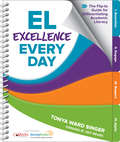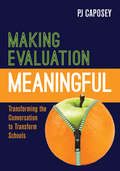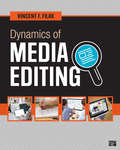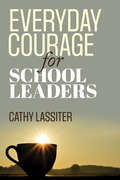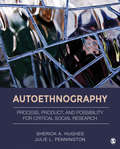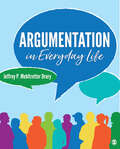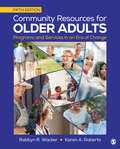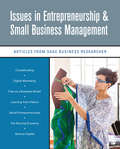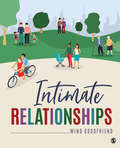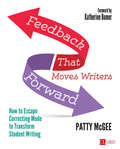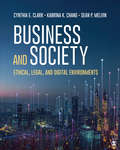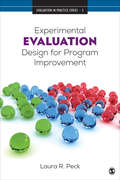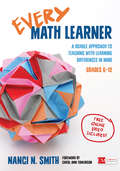- Table View
- List View
EL Excellence Every Day: The Flip-to Guide for Differentiating Academic Literacy
by Tonya W. SingerTake the Flip-to Book Tour! You have to see this book to believe this book. And once you use this book it will quickly become your most treasured teaching resource. What exactly is so remarkable? All of the best teaching tools in language and literacy are at your fingertips! Just flip to that strategy you want to learn or that literacy goal you want to reach for a wealth of ready-to-use resources to actively engage learners, build academic language, and strategically support literacy instruction. Much more than a resource for EL specialists, EL Excellence Every Day is written for every teacher, with a singular focus on improving the ways we all differentiate literacy instruction. Busy teachers especially will appreciate: Over 85 flip-to strategies that help you engage and support all learners 200+ prompts and linguistic scaffolds to facilitate academic conversations connected to specific literacy goals Lesson-ready resources for essential literacy goals: anticipate before reading, read to understand, read to analyze and infer, and write with text evidence Formative assessment tasks and if/then charts for personalizing teaching to every student Differentiation guides that demonstrate how to adjust supports across EL proficiency levels Intuitive, color-coded design so you can find what you need, when you need it No one lesson or strategy is ever the perfect solution for every student. No one student learns in the same way. If there’s one universal truth in teaching it’s that every child is unique. Devour this book and soon enough you’ll provide the excellent literacy instruction each and every student deserves each and every day. "We need resources that clearly and quickly help us to meet diverse instructional needs every day in every classroom. Tonya Ward Singer’s EL Excellence Every Day: The Flip-to Guide for Differentiating Academic Literacy is such a resource." --JEFF ZWIERS, from the foreword
Making Evaluation Meaningful: Transforming the Conversation to Transform Schools
by P J CaposeyRe-evaluate your perspective on teacher evaluation to truly transform school performance! The tools, strategies, and reflections in this book provide realistic solutions to the problem faced by many schools: meaningless evaluation. A considerable amount of time, energy, and money is spent on the teacher evaluation process, yet the question remains whether it is truly transforming the learning of teachers and, therefore, students. This practical guide shows how evaluation can become the tie that binds all school improvement activities together to: Bring clarity and purpose to all educators making their roles more effective Improve teacher practice since they receive better support Increase student achievement and overall school culture "For years, building leaders have been agonizing over teacher evaluations, pouring countless hours into a practice that consistently fails to produce the desired result; more meaningful conversations that produce improved quality instructional practices and increases in student achievement. In his book, Making Evaluation Meaningful, PJ Caposey shares a step by step framework filled with quick & easy to follow "Tips for Tomorrow," as well as detailed examples to help you shift your mindset and behave yourself to a more effective instructional leader. This book will leave you questioning your own evaluation system while at the same time inspiring you to re-commit the time and resources needed to help grow and develop your teachers." —Jimmy Casas, Principal and CEO " PJ Caposey, through a practitioner lens, has developed an incredible guide that not only helps to demystify the evaluation process, but also provide ready-to- use strategies to ensure reflection and growth are the result. In the end evaluation must be meaningful for both parties. This book will help get you there." —Eric Sheninger, Author/Consultant, Senior Fellow/Thought Leader "PJ Caposey has developed a great resource on teacher evaluation that actually provides realistic, encouraging, and supportive guidance instead of an arbitrary checklist!" —Larry Ferlazzo, Teacher, Author and Education Week Teacher advice blogger Luther Burbank High School, Sacramento, CA
Making Evaluation Meaningful: Transforming the Conversation to Transform Schools
by P J CaposeyRe-evaluate your perspective on teacher evaluation to truly transform school performance! The tools, strategies, and reflections in this book provide realistic solutions to the problem faced by many schools: meaningless evaluation. A considerable amount of time, energy, and money is spent on the teacher evaluation process, yet the question remains whether it is truly transforming the learning of teachers and, therefore, students. This practical guide shows how evaluation can become the tie that binds all school improvement activities together to: Bring clarity and purpose to all educators making their roles more effective Improve teacher practice since they receive better support Increase student achievement and overall school culture "For years, building leaders have been agonizing over teacher evaluations, pouring countless hours into a practice that consistently fails to produce the desired result; more meaningful conversations that produce improved quality instructional practices and increases in student achievement. In his book, Making Evaluation Meaningful, PJ Caposey shares a step by step framework filled with quick & easy to follow "Tips for Tomorrow," as well as detailed examples to help you shift your mindset and behave yourself to a more effective instructional leader. This book will leave you questioning your own evaluation system while at the same time inspiring you to re-commit the time and resources needed to help grow and develop your teachers." —Jimmy Casas, Principal and CEO " PJ Caposey, through a practitioner lens, has developed an incredible guide that not only helps to demystify the evaluation process, but also provide ready-to- use strategies to ensure reflection and growth are the result. In the end evaluation must be meaningful for both parties. This book will help get you there." —Eric Sheninger, Author/Consultant, Senior Fellow/Thought Leader "PJ Caposey has developed a great resource on teacher evaluation that actually provides realistic, encouraging, and supportive guidance instead of an arbitrary checklist!" —Larry Ferlazzo, Teacher, Author and Education Week Teacher advice blogger Luther Burbank High School, Sacramento, CA
Dynamics of Media Editing
by Vincent F. FilakAs traditional newsrooms staffed by journalists and managed by experienced editors become less and less common, there is an even greater need for all types of professional writers to be fluent in the editorial process. Dynamics of Media Editing emphasizes the broad value of editing as both a tool for journalistic management and an essential skill for individual writers of all stripes. Author Vince F. Filak recognizes editing as an essential process for improving the quality of published writing, something that is relevant and essential to investigative journalists, social media interns, celebrity bloggers, and everyone in between. By organizing the book around skills and by platforms, Dynamics of Media Editing shows students how the basic principles of good editing work across disciplines and media platforms. Key Features The emphasis on transferrable skills and multiple platforms shows students how to use the basic principles of good editing for journalism, PR, advertising, or social media marketing. The book takes a broad approach to editing, demonstrating that it’s not just a skill for managers at newspapers, but rather an essential process for improving all aspects of published writing. This addresses a critical course challenge, in that many students don’t see the relevance of editing in their planned careers. The audience-centric method emphasizes the need to engage one’s audience in order to be a successful writer. "Helpful Hints" boxes provide easy-to-consult lists of dos and don’ts for good writing. "Thoughts From a Pro" boxes allow media professionals from a variety of backgrounds to demonstrate the essential function of the editing process in the workplace.
Dynamics of Media Editing
by Vincent F. FilakAs traditional newsrooms staffed by journalists and managed by experienced editors become less and less common, there is an even greater need for all types of professional writers to be fluent in the editorial process. Dynamics of Media Editing emphasizes the broad value of editing as both a tool for journalistic management and an essential skill for individual writers of all stripes. Author Vince F. Filak recognizes editing as an essential process for improving the quality of published writing, something that is relevant and essential to investigative journalists, social media interns, celebrity bloggers, and everyone in between. By organizing the book around skills and by platforms, Dynamics of Media Editing shows students how the basic principles of good editing work across disciplines and media platforms. Key Features The emphasis on transferrable skills and multiple platforms shows students how to use the basic principles of good editing for journalism, PR, advertising, or social media marketing. The book takes a broad approach to editing, demonstrating that it’s not just a skill for managers at newspapers, but rather an essential process for improving all aspects of published writing. This addresses a critical course challenge, in that many students don’t see the relevance of editing in their planned careers. The audience-centric method emphasizes the need to engage one’s audience in order to be a successful writer. "Helpful Hints" boxes provide easy-to-consult lists of dos and don’ts for good writing. "Thoughts From a Pro" boxes allow media professionals from a variety of backgrounds to demonstrate the essential function of the editing process in the workplace.
Everyday Courage for School Leaders
by Cathy J. LassiterDevelop and enhance Leadership Courage to lead every day with equity and excellence! Have you ever wondered how or where you find the inner strength and determination to stand up and lead fellow administrators, teachers, or students to meet ever-changing expectations? Courage is a "must have" for effective leadership. Everyday Courage guides readers to develop Leadership Courage from within and become exceptional and resilient. In addition to expanding instructional leadership, practical elements and features include: • How to Take Action: make specific plans to activate moral courage, intellectual courage, empathetic courage, and disciplined courage • Daily Practices: exercises in accountability, trust, and risk-taking maintain courageous leadership for equity, excellence, and inclusion • Courage Quotient: assess and consider your areas of strength and opportunities for growth through deliberate practice Whether you are new to leadership or seeking revitalization, Cathy Lassiter’s experience in all levels of educational management will focus you toward leading from a courageous mindset. "Leadership is about fostering growth, building capacity, and collaboratively working with stakeholders to create new ideas - this takes a great deal of courage. Cathy Lassiter creates a pathway for leaders to develop that courage, and shows them how to do it with empathy. Everyday Courage for School Leaders is an outstanding read for anyone new to leadership and those who need to revitalize their thinking." - Peter DeWitt, Author/Consultant "A great resource to support leaders as they revise, reflect, and reassure staff, students, and community of the possibilities through their leadership as we embrace the courage to accomplish goals to achieve success." - Brenda Yoho, Director of Educational Support Programs
Everyday Courage for School Leaders
by Cathy J. LassiterDevelop and enhance Leadership Courage to lead every day with equity and excellence! Have you ever wondered how or where you find the inner strength and determination to stand up and lead fellow administrators, teachers, or students to meet ever-changing expectations? Courage is a "must have" for effective leadership. Everyday Courage guides readers to develop Leadership Courage from within and become exceptional and resilient. In addition to expanding instructional leadership, practical elements and features include: • How to Take Action: make specific plans to activate moral courage, intellectual courage, empathetic courage, and disciplined courage • Daily Practices: exercises in accountability, trust, and risk-taking maintain courageous leadership for equity, excellence, and inclusion • Courage Quotient: assess and consider your areas of strength and opportunities for growth through deliberate practice Whether you are new to leadership or seeking revitalization, Cathy Lassiter’s experience in all levels of educational management will focus you toward leading from a courageous mindset. "Leadership is about fostering growth, building capacity, and collaboratively working with stakeholders to create new ideas - this takes a great deal of courage. Cathy Lassiter creates a pathway for leaders to develop that courage, and shows them how to do it with empathy. Everyday Courage for School Leaders is an outstanding read for anyone new to leadership and those who need to revitalize their thinking." - Peter DeWitt, Author/Consultant "A great resource to support leaders as they revise, reflect, and reassure staff, students, and community of the possibilities through their leadership as we embrace the courage to accomplish goals to achieve success." - Brenda Yoho, Director of Educational Support Programs
Autoethnography: Process, Product, and Possibility for Critical Social Research
by Sherick A. Hughes Julie L. Pennington2020 Society of Professors of Education Outstanding Book Award winner Autoethnography: Process, Product, and Possibility for Critical Social Research provides a short introduction to the methodological tools and concepts of autoethnography, combining theoretical approaches with practical "how to" information. Written for social science students, teachers, teacher educators, and educational researchers, the text shows readers how autoethnographers collect, analyze, and report data. With its grounding in critical social theory and inclusion of innovative methods, this practical resource will move the field of autoethnography forward.
Argumentation in Everyday Life
by Jeffrey P. Drury"Good coverage of concepts with understandable explanations of theory. Very user friendly with exercises to use in and out of class. Connects well with other communication classes through the application of other communication concepts to argumentation." —Christopher Leland, Azusa Pacific University Argumentation in Everyday Life provides students with the tools they need to argue effectively in the classroom and beyond. Jeffrey P. Mehltretter Drury offers rich coverage of theory while balancing everyday applicability, allowing students to use their skills soundly. Drury introduces the fundamentals of constructing and refuting arguments using the Toulmin model and ARG conditions (Acceptability, Relevance, and Grounds). Numerous real-world examples are connected to the theories of rhetoric and argumentation discussed—enabling students to practice and apply the content in personal, civic, and professional contexts, as well as traditional academic debates. Encouraging self-reflection, this book empowers students to find their voice and create positive change through argumentation in everyday life. Unique resources to help students navigate this complex terrain of argumentation: "The Debate Situation" offers students a birds-eye view of any given debate (or exchange of arguments between two or more people) organized around three necessary components: arguments, issues, and the proposition. The visual model of the debate situation illustrates how these features work together in guiding a debate and it lays the groundwork for understanding and generating arguments. Easy to Use Standards for Evaluating Arguments combine a prominent argument model (named after logician Stephen Toulmin) with a standards-based approach (the ARG conditions) to test of quality of an argument. The ARG conditions are three questions an advocate should ask of an argument in determining whether or not it is rationally persuasive. These questions are best served by research but don’t necessary require it, and thus they provide a useful posture for critically assessing the arguments you encounter. Multiple "Everyday Life" examples with an emphasis on context help students to connect the lessons more fully to their everyday life and encourages them to grapple explicitly with dilemmas arising in different contexts. "Find Your Voice Prompts" focus on choice & empowerment to offer strategies for students to choose which arguments to address and how to address them—empowering students to use argumentation to find their voice. "Build Your Skill Prompts" use objective applications to test how well students have learned the information. They offer a chance to apply the material to additional examples that students can check against the answers in Appendix II. Two application exercises at the end of each chapter encourage students to think critically about the content, discuss their thoughts with their peers, and apply the material to everyday situations.
Argumentation in Everyday Life
by Jeffrey P. Drury"Good coverage of concepts with understandable explanations of theory. Very user friendly with exercises to use in and out of class. Connects well with other communication classes through the application of other communication concepts to argumentation." —Christopher Leland, Azusa Pacific University Argumentation in Everyday Life provides students with the tools they need to argue effectively in the classroom and beyond. Jeffrey P. Mehltretter Drury offers rich coverage of theory while balancing everyday applicability, allowing students to use their skills soundly. Drury introduces the fundamentals of constructing and refuting arguments using the Toulmin model and ARG conditions (Acceptability, Relevance, and Grounds). Numerous real-world examples are connected to the theories of rhetoric and argumentation discussed—enabling students to practice and apply the content in personal, civic, and professional contexts, as well as traditional academic debates. Encouraging self-reflection, this book empowers students to find their voice and create positive change through argumentation in everyday life. Unique resources to help students navigate this complex terrain of argumentation: "The Debate Situation" offers students a birds-eye view of any given debate (or exchange of arguments between two or more people) organized around three necessary components: arguments, issues, and the proposition. The visual model of the debate situation illustrates how these features work together in guiding a debate and it lays the groundwork for understanding and generating arguments. Easy to Use Standards for Evaluating Arguments combine a prominent argument model (named after logician Stephen Toulmin) with a standards-based approach (the ARG conditions) to test of quality of an argument. The ARG conditions are three questions an advocate should ask of an argument in determining whether or not it is rationally persuasive. These questions are best served by research but don’t necessary require it, and thus they provide a useful posture for critically assessing the arguments you encounter. Multiple "Everyday Life" examples with an emphasis on context help students to connect the lessons more fully to their everyday life and encourages them to grapple explicitly with dilemmas arising in different contexts. "Find Your Voice Prompts" focus on choice & empowerment to offer strategies for students to choose which arguments to address and how to address them—empowering students to use argumentation to find their voice. "Build Your Skill Prompts" use objective applications to test how well students have learned the information. They offer a chance to apply the material to additional examples that students can check against the answers in Appendix II. Two application exercises at the end of each chapter encourage students to think critically about the content, discuss their thoughts with their peers, and apply the material to everyday situations.
Community Resources for Older Adults: Programs and Services in an Era of Change
by Karen A. Roberto Robbyn R. WackerCommunity Resources for Older Adults provides comprehensive, up-to-date information on programs, services, and policies pertaining to older adults. Authors Robbyn R. Wacker and Karen A. Roberto build reader awareness of programs and discuss how to better understand help-seeking behavior, as well as explain ways to take advantage of the resources available to older adults. The substantially revised Fifth Edition includes new topics and updated research, tables, and figures to help answer key questions about the evolution and utilization of programs for older adults and the challenges that service providers face.
Community Resources for Older Adults: Programs and Services in an Era of Change
by Karen A. Roberto Robbyn R. WackerCommunity Resources for Older Adults provides comprehensive, up-to-date information on programs, services, and policies pertaining to older adults. Authors Robbyn R. Wacker and Karen A. Roberto build reader awareness of programs and discuss how to better understand help-seeking behavior, as well as explain ways to take advantage of the resources available to older adults. The substantially revised Fifth Edition includes new topics and updated research, tables, and figures to help answer key questions about the evolution and utilization of programs for older adults and the challenges that service providers face.
Issues in Entrepreneurship & Small Business Management: Articles from SAGE Business Researcher
by SAGE Business ResearcherHow different is the sharing economy from the traditional economy? What can entrepreneurs learn from failure? Can start-ups change the world? SAGE Business Researcher’s Issues in Entrepreneurship offers an in-depth and nuanced look at a wide range of today’s latest issues and controversies in entrepreneurship. This new collection of timely readings delves into current topics such as learning from failure, social entrepreneurship, flat management, crowdfunding, and more. Written with the rigor and immediacy of the best explanatory journalism, each issue provides deep, balanced, and authoritative coverage on the selected topic and key research, pointing students to reliable resources for further inquiry. These articles are perfect for outside reading assignments or in-class debates for any introductory entrepreneurship course.
Issues in Entrepreneurship & Small Business Management: Articles from SAGE Business Researcher
by SAGE Business ResearcherHow different is the sharing economy from the traditional economy? What can entrepreneurs learn from failure? Can start-ups change the world? SAGE Business Researcher’s Issues in Entrepreneurship offers an in-depth and nuanced look at a wide range of today’s latest issues and controversies in entrepreneurship. This new collection of timely readings delves into current topics such as learning from failure, social entrepreneurship, flat management, crowdfunding, and more. Written with the rigor and immediacy of the best explanatory journalism, each issue provides deep, balanced, and authoritative coverage on the selected topic and key research, pointing students to reliable resources for further inquiry. These articles are perfect for outside reading assignments or in-class debates for any introductory entrepreneurship course.
Intimate Relationships
by Wind GoodfriendRecipient of a 2021 Most Promising New Textbook Award from the Textbook & Academic Authors Association (TAA) Intimate Relationships provides students with a comprehensive understanding of the science behind relationships using a modern approach. Award-winning teacher and author Wind Goodfriend integrates coverage of family and friendship relationships in context with research methods, open science, theories, and romantic relationships so that readers can learn about all types of relationships and their interactions, including conflict and the dark side of relationships. The text supports today′s students by frequently applying relationship theories to examples that can be found in popular culture, helping students see how psychology can apply to the world that surrounds them. Included with this title: The password-protected Instructor Resource Site (formally known as SAGE Edge) offers access to all text-specific resources, including a test bank and editable, chapter-specific PowerPoint® slides.
Intimate Relationships
by Wind GoodfriendRecipient of a 2021 Most Promising New Textbook Award from the Textbook & Academic Authors Association (TAA) Intimate Relationships provides students with a comprehensive understanding of the science behind relationships using a modern approach. Award-winning teacher and author Wind Goodfriend integrates coverage of family and friendship relationships in context with research methods, open science, theories, and romantic relationships so that readers can learn about all types of relationships and their interactions, including conflict and the dark side of relationships. The text supports today′s students by frequently applying relationship theories to examples that can be found in popular culture, helping students see how psychology can apply to the world that surrounds them. Included with this title: The password-protected Instructor Resource Site (formally known as SAGE Edge) offers access to all text-specific resources, including a test bank and editable, chapter-specific PowerPoint® slides.
Feedback That Moves Writers Forward: How to Escape Correcting Mode to Transform Student Writing (Corwin Literacy)
by Patty McGee"Patty McGee should be called the ′Writer Whisperer.′ She offers brilliant advice for helping struggling writers, accomplished writers, and all those in between." —Debbie Silver, Co-author of Teaching Kids to Thrive The number one challenge of student writers today isn’t word choice, logic, voice, or even grammar and spelling—it’s buy-in. In Feedback That Moves Writers Forward, Patty McGee shares how to’s for teaching that changes the writing-as-obligation vibe for good. She demonstrates the way feedback can inspire students to reach new heights as writers. With Patty’s help, you learn to: Resign from your position as Corrector-in-Chief and be amazed as students eagerly take over responsibility for refining their writing Apply the research on growth mindset and goal setting, whether you use a writing program or a workshop model Use tone, trust, and language to quicken students’ discovery of their writing identities and take risks when they are stuck Use student work to deliver clear, just-in-time feedback during planning, drafting, revising, and editing Use the online printable forms for delivering customized feedback with just the right wording Balance grading and feedback Help writers reflect so they are better able to apply what they learned about content, craft, and style to their future writing One of the bravest things we can do as teachers is to admit when a long held practice isn’t working. Error-focused feedback is one such practice. So put down the red pen, pick up this book, and learn to say the right thing at the right time to develop fearless, original, and intentional writers—in any content area.
Feedback That Moves Writers Forward: How to Escape Correcting Mode to Transform Student Writing (Corwin Literacy)
by Patty McGee"Patty McGee should be called the ′Writer Whisperer.′ She offers brilliant advice for helping struggling writers, accomplished writers, and all those in between." —Debbie Silver, Co-author of Teaching Kids to Thrive The number one challenge of student writers today isn’t word choice, logic, voice, or even grammar and spelling—it’s buy-in. In Feedback That Moves Writers Forward, Patty McGee shares how to’s for teaching that changes the writing-as-obligation vibe for good. She demonstrates the way feedback can inspire students to reach new heights as writers. With Patty’s help, you learn to: Resign from your position as Corrector-in-Chief and be amazed as students eagerly take over responsibility for refining their writing Apply the research on growth mindset and goal setting, whether you use a writing program or a workshop model Use tone, trust, and language to quicken students’ discovery of their writing identities and take risks when they are stuck Use student work to deliver clear, just-in-time feedback during planning, drafting, revising, and editing Use the online printable forms for delivering customized feedback with just the right wording Balance grading and feedback Help writers reflect so they are better able to apply what they learned about content, craft, and style to their future writing One of the bravest things we can do as teachers is to admit when a long held practice isn’t working. Error-focused feedback is one such practice. So put down the red pen, pick up this book, and learn to say the right thing at the right time to develop fearless, original, and intentional writers—in any content area.
Bright Ribbons: Weaving Culturally Responsive Teaching Into the Elementary Classroom
by Lotus Linton HowardWeave culturally responsive teaching into every lesson and activity Culturally responsive teaching practices are like bright ribbons: when you weave them into everything you teach, you create a beautiful tapestry for successful learning. Lotus Howard, who has spent four decades teaching in diverse classrooms, will show you how to build relationships with your students and create a harmonious community where every child can thrive. You’ll learn: How to use culturally responsive teaching (CRT) not as an add-on, but as a philosophy that infuses every aspect of the school day Simple strategies for weaving the seven principles of CRT into all lessons and activities, including morning greetings, transition times, and group work How to be more self-reflective to better appreciate and unlock students’ unique gifts With an array of practical tips, model lessons, and resources, this book will inspire you to weave a holistic tapestry of teaching and learning that benefits all children.
Bright Ribbons: Weaving Culturally Responsive Teaching Into the Elementary Classroom
by Lotus Linton HowardWeave culturally responsive teaching into every lesson and activity Culturally responsive teaching practices are like bright ribbons: when you weave them into everything you teach, you create a beautiful tapestry for successful learning. Lotus Howard, who has spent four decades teaching in diverse classrooms, will show you how to build relationships with your students and create a harmonious community where every child can thrive. You’ll learn: How to use culturally responsive teaching (CRT) not as an add-on, but as a philosophy that infuses every aspect of the school day Simple strategies for weaving the seven principles of CRT into all lessons and activities, including morning greetings, transition times, and group work How to be more self-reflective to better appreciate and unlock students’ unique gifts With an array of practical tips, model lessons, and resources, this book will inspire you to weave a holistic tapestry of teaching and learning that benefits all children.
Business and Society: Ethical, Legal, and Digital Environments
by Sean P. Melvin Cynthia E. Clark Kabrina K. ChangRecipient of a 2021 Most Promising New Textbook Award from the Textbook & Academic Authors Association (TAA) Business and Society: Ethical, Legal, and Digital Environments prepares students for the modern workplace by exploring the opportunities and challenges they will face in today′s interconnected, global economy. The author team discusses legal and ethical issues throughout and uses real-world cases to provide students with a holistic understanding of stakeholder issues. Chapters on social media and citizen movements, big data and hacking, and privacy in the digital age provide in-depth coverage of how technology is transforming the relationship between organizations and consumers. Included with this title: The password-protected Instructor Resource Site (formally known as SAGE Edge) offers access to all text-specific resources, including a test bank and editable, chapter-specific PowerPoint® slides.
Business and Society: Ethical, Legal, and Digital Environments
by Sean P. Melvin Cynthia E. Clark Kabrina K. ChangRecipient of a 2021 Most Promising New Textbook Award from the Textbook & Academic Authors Association (TAA) Business and Society: Ethical, Legal, and Digital Environments prepares students for the modern workplace by exploring the opportunities and challenges they will face in today′s interconnected, global economy. The author team discusses legal and ethical issues throughout and uses real-world cases to provide students with a holistic understanding of stakeholder issues. Chapters on social media and citizen movements, big data and hacking, and privacy in the digital age provide in-depth coverage of how technology is transforming the relationship between organizations and consumers. Included with this title: The password-protected Instructor Resource Site (formally known as SAGE Edge) offers access to all text-specific resources, including a test bank and editable, chapter-specific PowerPoint® slides.
Experimental Evaluation Design for Program Improvement (Evaluation in Practice Series #5)
by Laura R. PeckThe concepts of cause and effect are critical to the field of program evaluation. Experimentally-designed evaluations—those that randomize to treatment and control groups—offer a convincing means for establishing a causal connection between a program and its effects. Experimental Evaluation Design for Program Improvement considers a range of impact evaluation questions, particularly those questions that focus on the impact of specific aspects of a program. Laura R. Peck shows how a variety of experimental evaluation design options can provide answers to these questions, and she suggests opportunities for experiments to be applied in more varied settings and focused on program improvement efforts.
Experimental Evaluation Design for Program Improvement (Evaluation in Practice Series #5)
by Laura R. PeckThe concepts of cause and effect are critical to the field of program evaluation. Experimentally-designed evaluations—those that randomize to treatment and control groups—offer a convincing means for establishing a causal connection between a program and its effects. Experimental Evaluation Design for Program Improvement considers a range of impact evaluation questions, particularly those questions that focus on the impact of specific aspects of a program. Laura R. Peck shows how a variety of experimental evaluation design options can provide answers to these questions, and she suggests opportunities for experiments to be applied in more varied settings and focused on program improvement efforts.
Every Math Learner, Grades 6-12: A Doable Approach to Teaching With Learning Differences in Mind (Corwin Mathematics Series)
by Nanci N. SmithAs a secondary mathematics teacher, you know that students are different and learn differently. And yet, when students enter your classroom, you somehow must teach these unique individuals deep mathematics content using rigorous standards. The curriculum is vast and the stakes are high. Is differentiation really the answer? How can you make it work? Nationally recognized math differentiation expert Nanci Smith debunks the myths, revealing what differentiation is and isn’t. In this engaging book Smith reveals a practical approach to teaching for real learning differences. You’ll gain insights into an achievable, daily differentiation process for ALL students. Theory-lite and practice-heavy, this book shows how to maintain order and sanity while helping your students know, understand, and even enjoy doing mathematics. Classroom videos, teacher vignettes, ready-to-go lesson ideas and rich mathematics examples help you build a manageable framework of engaging, sense-making math. Busy secondary mathematics teachers, coaches, and teacher teams will learn to Provide practical structures for assessing how each of your students learns and processes mathematics concepts Design, implement, manage, and formatively assess and respond to learning in a differentiated classroom Plan specific, standards-aligned differentiated lessons, activities, and assessments Adjust current instructional materials and program resources to better meet students′ needs This book includes classroom videos, in-depth student work samples, student surveys, templates, before-and-after lesson demonstrations, examples of 5-day sequenced lessons, and a robust companion website with downloadables of all the tools in the books plus other resources for further planning. Every Math Learner, Grades 6-12 will help you know and understand your students as learners for daily differentiation that accelerates their mathematics comprehension. "This book is an excellent resource for teachers and administrators alike. It clearly explains key tenants of effective differentiation and through an interactive approach offers numerous practical examples of secondary mathematics differentiation. This book is a must read for any educator looking to reach all students." —Brad Weinhold, Ed.D., Assistant Principal, Overland High School
